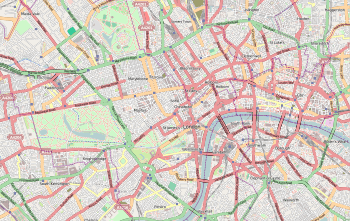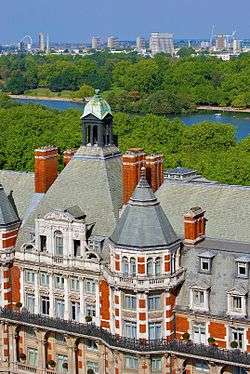Mandarin Oriental Hyde Park, London
| Mandarin Oriental Hyde Park, London | |
|---|---|
 | |
 Location within Central London | |
| General information | |
| Location | 66 Knightsbridge, London, United Kingdom |
| Coordinates | 51°30′08″N 0°09′36″W / 51.50222°N 0.16000°W |
| Opening | 1902, reopened in 2000 after a complete renovation |
| Owner | Mandarin Oriental Hotel Group |
| Management | Mandarin Oriental Hotel Group |
| Other information | |
| Number of rooms | 173 |
| Number of suites | 25 |
| Number of restaurants | 3 |
| Website | |
| http://www.mandarinoriental.com/london/ | |
Mandarin Oriental Hyde Park, London is a five-star hotel, located in the Knightsbridge district of London, owned and managed by Mandarin Oriental Hotel Group. Housed in an historic, Edwardian-style building, the hotel originally opened its doors to the public as the Hyde Park Hotel in 1902. Mandarin Oriental Hotel Group purchased the hotel in 1996 and conducted a complete renovation of the 198 rooms and suites, as well as a re-design of the restaurants and bar. Mandarin Oriental Hyde Park, London re-opened in May 2000.[1][2]
History

The early years
Overlooking London’s Hyde Park on one side and Knightsbridge on the other, the hotel was originally built in 1889 as an exclusive ‘Gentleman’s Club’.[2]
The project, originally known as Hyde Park Court, was announced in August 1887 but was delayed by endless planning disagreements, the most notable dispute being the proposed height of the development, which was to be the tallest building in London. Outraged residents feared a shadow would be cast over the Serpentine lake in Hyde Park and they threatened to force the builders to reduce the number of floors by putting up a wooden barrier which would block the light to the lower floors. An unsuccessful Bill was brought before Parliament to reduce the restriction of buildings from 100 feet to 60 feet, and so the original design of the hotel remained.[2]
Considerable skill was deployed in the creation of the dramatic skyline using red brick and Portland stone in an eclectic Franco-Flemish style. Loggias were built to provide space for a pleasant summer’s evening lounge and promenade overlooking the park. Each of the first three floors was designed with four family suites and a bachelor’s suite. The upper floors were planned as single residences of varying sizes; however, more than half the tenants occupied at least two or more suites.
The palatial interior decoration and the use of marbles and gilding were years ahead of the best London hotels of the time. The hall, entered from Knightsbridge through swinging doors of carved walnut, was lined with coloured marble and had a frescoed ceiling, as well as a marble chimney-piece complete with a marble clock. Stairs of white marble flanked with balustrades led to the upper ground floor. This style of decoration continued in the principal communal rooms, including the breakfast and dining room overlooking Hyde Park.[2]
Major fire
In 1899, a fire struck the property, damaging the top three floors of the Knightsbridge wing and destroying part of the roof, including the central iron and glass turret. All residents made a successful escape, despite the fire brigade’s ladders only reaching halfway up the building.[2]
After the renovations, the building was reopened in 1902 as the Hyde Park Hotel, London’s newest and grandest hotel. The ceilings and marble floors had survived, and period fireplaces in the style of Louis XV and XVI were installed, while the furnishings echoed the 18th century style of Sheraton and Hepplewhite.[2]
Between 1911 and 1912, the Ballroom was redecorated in a style of Louis XVI. In 1925, the architects Charles Frédéric Mewès and Arthur Joseph Davis, who also remodeled some of the principal rooms in a traditional Louis XV style, added a Palm Court.[2]
A Royal Entrance
As a private 'Gentleman’s Club' the entrance to the building was through the Loggia, but in 1902, when it reopened as Hyde Park Hotel, the postal address changed from Albert Gate to 66 Knightsbridge. Tradition has it that the Queen would not allow any form of advertising within the Park, and therefore insisted that the main entrance, with the hotel’s name above it, be moved from the Park side to Knightsbridge. The Queen consequently mandated that the original entrance be preserved for Royal use, unless permission is otherwise granted by the Royal Household, which has been upheld ever since. The doors were opened during the coronation of King George VI and Queen Elizabeth in 1937 when the Crown gave special permission for the guests to use the park entrance.[2]
Today, guests of Mandarin Oriental Hyde Park, London can still take part in this tradition of the hotel by requesting permission from the Royal Parks to use the ‘Royal Entrance’ for special occasions. Guests who have been granted access to this entrance include members of the Japanese Imperial family, former South African Premier General Hertzog, and a President of Uganda.[2]
Noteworthy Events
Many important events have been held at the Hyde Park Hotel. A few such events were Lady Doris Vyner’s silver wedding party in 1948, with the King and Queen as guests of honor, and the legendary Balaclava Ball, hosted by the five cavalry regiments who had taken part in the Balaclava charge, also attended by the Queen, Prince Philip, and the late Queen Mother.[2]
Other celebrations include the 1992 production of “Pavarotti in the Park”, one of the country’s largest open-air concerts, the 1995 Anniversary of VE Day in which seven Heads of State and their delegations took up residence, and ‘Party in the Park’, one of Europe’s largest music events. The hotel was also proud to host the 80th birthday party of Lady Thatcher which was attended most notably by HM The Queen and HRH The Duke of Edinburgh along with former Prime Ministers Sir John Major & Tony Blair, former politician Lord Archer, entertainers Dame Shirley Bassey and Joan Collins among others.[2]
On 28 April 2011, the Queen's cousin once removed, Lady Elizabeth Anson, organised a party here hosted by The Queen, for members of the British royal family and for the crowned heads who were attending the royal wedding the following day.
Mandarin Oriental Hyde Park, London
Mandarin Oriental Hotel Group purchased the Hyde Park Hotel in November 1996 and renamed it Mandarin Oriental Hyde Park, London. Following a £57 million restoration, and its re-opening in May 2000, Mandarin Oriental Hyde Park has received numerous awards for its service, restaurants, and management, most recently a Michelin star for its signature restaurant Foliage for eight consecutive years.[2][3]
The Hotel
The hotel contains 173 rooms and 25 suites, over half of which overlook Hyde Park. The hotel operates three restaurants: two of which are open year-round, and the Mandarin Bar. Additional on-site amenities include a spa, fitness centre, and both large and small events spaces.[4] The hotel is located in Knightsbridge and in close proximity to such landmarks as the Royal Albert Hall and Apsley House.[5]
Restaurants & Bars
The interiors of the restaurants and bar were created by the designer Adam Tihany.[6]
- Dinner by Heston Blumenthal: Historic European food reinvented by the Michelin-starred chef
- Bar Boulud: French bistro and wine bar[7]
- Mandarin Bar: a chic, contemporary bar serving cocktails and light, International fare
- The Roseberry: Award-winning Afternoon Tea salon in the day serving Breakfast, Afternoon and Directors Reserve blends as well as teas created in conjunction with The East India Company; Champagne cocktail bar in the evening.
Fitness and Wellness Centre
The hotel has a fitness and wellbeing facility, that includes gym, a 17-meter stainless steel indoor swimming pool and a relaxation area with Four Senses Loungers.[8]
Photo gallery
 Household Cavalry passing Mandarin Oriental Hyde Park
Household Cavalry passing Mandarin Oriental Hyde Park Mandarin Bar
Mandarin Bar Prince of Wales suite
Prince of Wales suite Hyde Park suite
Hyde Park suite Mandarin Oriental Hyde Park guestroom
Mandarin Oriental Hyde Park guestroom Spa relaxation room
Spa relaxation room
See also
- Mandarin Oriental, Hong Kong
- Mandarin Oriental, Bangkok
- Mandarin Oriental, New York
- Mandarin Oriental, Miami
External links
| Wikimedia Commons has media related to Mandarin Oriental Hyde Park. |
- Mandarin Oriental Hyde Park, London
- Dining at Mandarin Oriental Hyde Park, London
- The Spa at Mandarin Oriental Hyde Park, London
References
- ↑ http://mandarinoriental.com/about_mo/media/press_kits/london/ten_facts.aspx
- 1 2 3 4 5 6 7 8 9 10 11 12 http://mandarinoriental.com/about_mo/media/press_kits/london/history.aspx
- ↑ http://mandarinoriental.com/london/news/
- ↑ http://mandarinoriental.com/about_mo/media/press_kits/london/hyde_park.aspx
- ↑ Knightsbridge
- ↑ http://mandarinoriental.com/about_mo/media/press_kits/london/dining.aspx
- ↑ Clarke, Roger (November 9, 2009). "Boulud Joins Blumenthal at the Mandarin". Zagat.com.
- ↑ http://www.hotelchatter.com/story/2014/3/22/152154/932/hotels/Mandarin_Oriental_Hyde_Park_Joins_the_Shortlist_of_London_Hotels_With_Pools
Coordinates: 51°30′08″N 0°09′36″W / 51.50226°N 0.16004°W